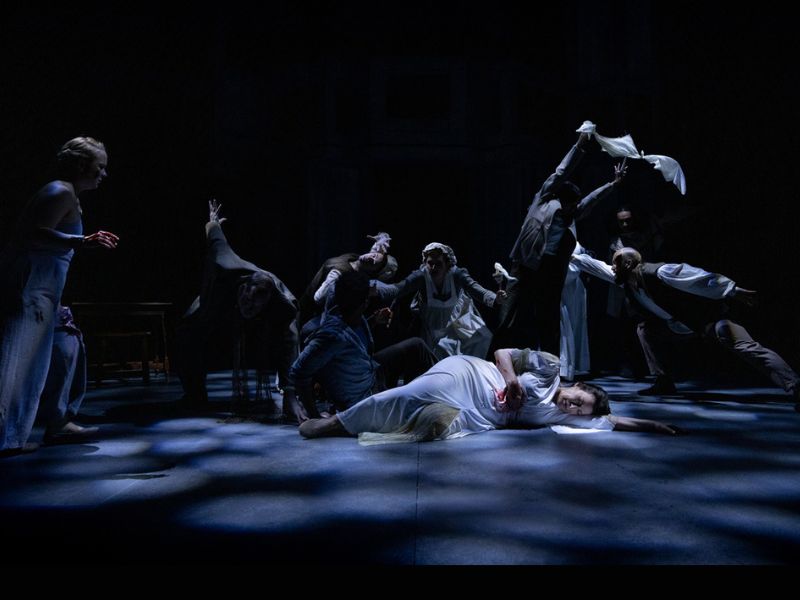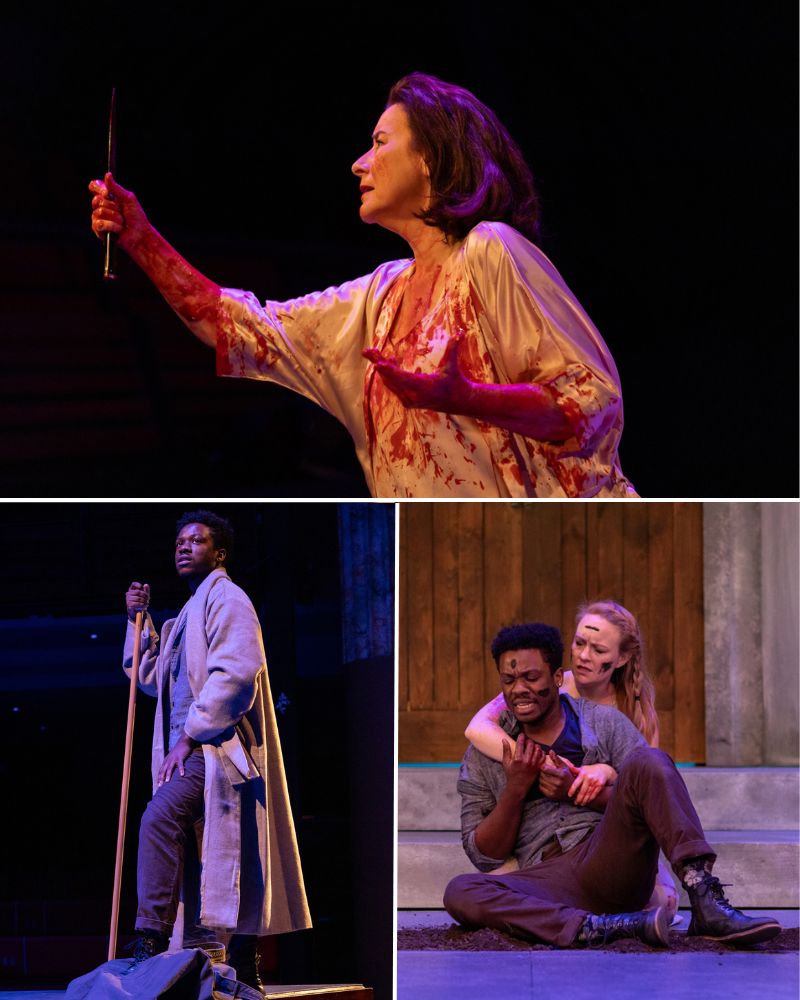The age-old dramaturgical question is always: “Why do this play now?” In the case of The Oresteia — currently onstage at Chesapeake Shakespeare Company and the company’s first foray into Greek tragedy — the answer is fraught if we are looking into an ancient play for contemporary parallels to our own times, our current wars, or our own modern understanding of abstract ideas like justice, vengeance, duty, family, or divinity. The reflection may (or may not) be there but in a highly distorted, fractured mirroring.
Rather we should admire The Oresteia as a window into an ancient, uncanny world of violence, cruelty, and slavery, but also the place where lofty concepts of Western philosophy, drama, and democracy emerged — those that shape our society to this day. There are many truths, as the play concludes in its final lines, and these truths can be contradictory, but that does not make them any less true in this vividly staged and captivating production directed by Lise Bruneau.

Ellen McLaughlin’s beautiful and cathartic adaptation of Aeschylus’ tragic trilogy — Agamemnon, The Libation Bearers, and The Eumenides (458 BCE) — concerns one of the most cursed families in Greek mythology, a family that has flouted all decency and committed acts of familial murder, cannibalism, incest, hubris, and impiety over succeeding generations. In this tragedy, the great commander of the Greek fleet, Agamemnon, King of Mycenae, sacrifices his daughter, Iphigenia, to commence the Trojan War; his queen, Clytemnestra, waits for ten years for her husband’s triumphant return for her revenge. After another decade, their adult son, Orestes, returns to Mycenae and, encouraged by his sister, Electra, seeks to avenge his father’s murder.
It’s a play that works because its horrors are not our own: the gendered vices and virtues are wholly alien; dreams are always prophetic, if the dreamers can decipher the meaning; and the gods are threatening, callous, and petty, making their presence known through their cruel demands and inhumane gifts. That is, it’s all (ancient) Greek to us, and that — along with the rich, lyrical verse and the vulnerable, humanness of the characters — is the beauty of this work.
As Clytemenstra, Isabelle Anderson is marvelous, regal, and nuanced. She can love and hate, and she can burn with a decade-long fire yet act cool and calm upon Agamemnon’s (Stephen Patrick Martin) return. She is a viper who dreams of nursing snakes, a vixen in her series of diaphanous dressing gowns (all designed by Kristina Lambdin), a victim of her husband’s love of honor, and she is vengeance personified. Anderson beautifully embraces all of this, as complex and rich in her choices and delivery onstage as the wine-dark Aegean sea.
There are strong performances by the actors playing the rest of the cursed family, too. Stephen Patrick Martin offers a stoic Agamemnon, who chooses masculine pride over protecting his own family. Young actress Charlotte Molitoris creates a haunting apparition of lost innocence throughout as Iphigenia. Lizzi Albert — always a pleasure in Shakespearean comedic parts — adds almost a bit of levity as the rebellious Electra, flipping the bird at her mother’s back. She is Cinderella with a vendetta, festering with ten years of revenge in her heart. And Isaiah Mason Harvey shines as Orestes, the conflicted heir who returns to claim the legacy left to him, one of unspeakable horrors and impossible choices. Whether acting as the vessel for Apollo, confronting his mother for her crimes, or pleading his case to the household servants-turned-jury, Harvey’s Orestes is deeply human and moving.

Overseeing all of this is the Greek Chorus — Gabriel Alejandro, Hana Clarice, Surasree Das, Lloyd Ekpe, Alie Karambash, Lesley Malin, Dawn Thomas Reidy, and David Yezzi — composed of household servants who quite literally clean up after the royal family, washing away the blood spilled in the house. They also become the frightful Furies chasing Orestes (with the help of strobe lights and dramatic poses) and finally, the jury who must hear Orestes’ case. Comprising all local actors and many of CSC’s most familiar faces including CSC’s producing executive director Malin, the Chorus often moves and then poses in tableaux vivant, asking rhetorical questions about the thornier issues of justice and revenge with overlapping lines and echoing words. Brought back as Agamememnon’s enslaved bride, the captive Cassandra (played by Emily Erickson as a wild-eyed prophetess) does not suffer a collective amnesia about the family’s sordid past: she sees all their generations of evil crimes and foresees her own pathetic ending.
The haunted House of Atreus — the facade of a gray stone palace with red poppies bursting forth — is effectively designed by Kathryn Kawecki. Under lighting designer Katie McCreary’s vision, the palace’s colors shift slightly whether in flashback scenes, turning green with decay, red with anger, or cold blue; when Orestes and Clytemnestra meet — the lights throb subtly with pink hues like a heartbeat or a womb. When Apollo speaks through Orestes or Cassandra, the stunning lighting by McCreary and sound design by Sarah O’Halloran create those moments of divine intervention. Less successful are the polychronic costumes by Kristina Lambdin: Clytemnestra says that walking through the halls one moves in and out of centuries but here it is too literal. Servant costumes range from medieval peasant tunics to Victorian butler and maid livery, and it is jarring when one servant sets down a laptop and Orestes takes off his traveler’s cloak to reveal a gray hoodie, as nothing else indicates a contemporary setting.
The Oresteia was commissioned by Shakespeare Theatre Company as the very last play directed by Michael Kahn at STC before his retirement. In many ways, his operatic direction of the work spoke to his vision for STC — grand classical theater that was momentous and epic in scale, but also intimate, probing, and vulnerable. At CSC, Lise Bruneau’s version has been scaled back, but nothing has been lost in doing so. It is now a family drama writ large, one that does not speak to our times and does not need to. It is its own truth, its own myth, its own tragedy, and it is in the questions it asks about our values that it becomes timeless.
Running Time: Two hours with one 15-minute intermission.
The Oresteia plays through March 10, 2024, at Chesapeake Shakespeare Company, 7 South Calvert Street, Baltimore, MD. Adult tickets start at $55; tickets for youth under 25 start at $28. Subscriptions and tickets can be purchased by calling 410-244-8570, ordering online at ChesapeakeShakespeare.com, or visiting the Box Office in person.
The Oresteia
Freely adapted by Ellen McLaughlin from the tragic trilogy by Aeschylus
CAST
CLYTEMNESTRA – Isabelle Anderson*+
IPHIGENIA – Charlotte Molitoris
AGAMENON – Stephen Patrick Martin +
ORESTES – Isaiah Mason Harvey●
CASSANDRA – Emily Erickson
ELECTRA – Lizzi Albert*
CHORUS – Gabriel Alejandro
CHORUS – Hana Clarice
CHORUS – Surasree Das
CHORUS – Lloyd Ekpe●
CHORUS – Alie Karambash
CHORUS – Lesley Malin*
CHORUS – Dawn Thomas Reidy*●
CHORUS- David Yezzi
UNDERSTUDIES
Lucy Redmon Connell, David Forrer*, Laura Malkus*
ARTISTIC AND CREATIVE TEAM
Director – Lise Bruneau○+
Production Manager – Sarah Curnoles*
Stage Manager – Alexis E. Davis*
Technical Director – Dan O’Brien*
Set Design – Kathryn Kawecki
Lighting Design – Katie McCreary*
Sound Design – Sarah O’Halloran
Music Director – Grace Srinivasan*
Costume Design – Kristina Lambdin*
Props Artisan – Trey Wise
Assistant Director – Lauren Davis*●
Production Associate – Dawn Thomas Reidy*●
Assistant Stage Manager – Tyrel Brown●
Associate Technical Director – Chester Stacy*
Fight Choreographer – Gerrad Alex Taylor*●+
Movement Advisor – Dance & Bmore
Board Operator – Theodore Sherron III
Wardrobe Manager – Harper LaBrozzi
Child Minder – Vanessa Strickland
Covid Safety Officer – Mandy Benedix*
Senior House Manager – Pamela Forton*●○
* CSC Company Member
+ Actors’ Equity Association
○ Stage Directors and Choreographers Society
● Black Classical Acting Ensemble Member





We just had the privilege of watching it yesterday. Don’t miss it!